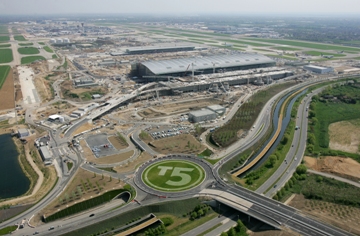BAA preparing for Windows 7 take off

Airport operator hopes Microsoft's latest OS will help cut costs and simplify infrastructure
Airport operator BAA is hoping the roll out of Windows 7 will help simplify its IT infrastructure and contribute to a cost-cutting initiative across the company.
Speaking at a Microsoft customer event in London this week, BAA CIO Philip Langsdale said the company has been testing Windows 7 and now plans to roll it out across the company.
BAA owns and operates seven UK airports, including Heathrow, which handle more than 200 million passengers per year.
Langsdale said BAA is planning to invest £60m in IT systems and infrastructure between 2008 and 2012 which will feed into a company-wide effort to reduce operation expenditure by £114m over the same period.

BAA's Heathrow airport with Terminal 5 in the foreground
(Photo credit: BAA)
A new operating system is part of this IT investment and Windows 7 has been chosen to replace BAA's generally Windows Vista environment for a number of reasons.
"The main purpose is usability - it's less clunky [than Vista] and it's easier for people to use," Langsdale told silicon.com.
He added that so far Windows 7 has proved to be reliable and secure, resulting in a lower number of support requests to his IT team, which also has an impact on cost.
"The evidence so far suggests it will reduce costs. We haven't done the maths but early indications are that [the number of] helpdesk calls have gone down," he explained.
Bringing the whole company onto Windows 7 is also intended to simplify the technology platform across the business so that it can be better managed and fits with BAA's strict governance requirements.
BAA still has a lot of work to do with its Windows 7 roll out as it discovered that 95 per cent of its desktop and laptop estate were below the spec required to run the operating system.
Langsdale said the company knew a significant hardware refresh was required and so the Windows 7 implementation will be carried out in a phased fashion to fit with this.
Langsdale added the company needs to take a "cautious" approach to the Windows 7 roll out due to financial constraints. "We're going to replace [hardware] over a period of 15 months," he said.
Langsdale's team has been testing Windows 7 using virtualisation technology from Citrix, which they found works well, and the team plans to use it for the wider roll out work. Langsdale told delegates at the Microsoft customer event: "Generally is has been a very good and easy migration."